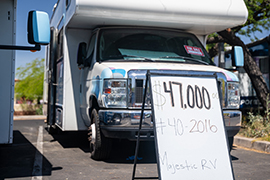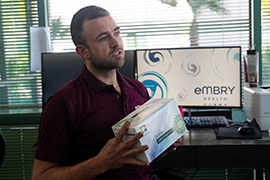- Slug: BC-CNS-Embry Sale,550 words.
- 3 photos available (thumbnails, captions below).
By Jack Wu
Cronkite News
TOLLESON – With the national COVID-19 public health emergency ending May 11, the company synonymous with testing in Arizona is winding down as well, holding a surplus supply sale.
Embry Health, which at one time had testing and vaccine locations around the state, is holding a sale through the end of May at its Tolleson warehouse. It’s selling its recreational vehicles and trailers at a separate sale in Chandler.
Embry Health CEO Raymond Embry said four testing locations remain, but with U.S. COVID-19 hospitalizations and deaths near new lows, it’s time to move in a new direction.
He said he regrets having to lay off the thousands of people who worked for Embry during the pandemic. When at-home COVID-19 test kits became widely available, the need for Embry’s testing service dwindled.
“When things change, the funding evaporates, and all of a sudden, you’re doing thousands of layoffs,” he said. “Nothing is more soul-deteriorating than that, and many times, these were people who’ve given the past two years of their life to fight the pandemic.”
In April 2022, Embry wrote to Congress, asking to restore funding for COVID-19 testing. He said that when the Health Resources and Services Administration COVID-19 Uninsured Program stopped accepting claims for testing, his company had to end free testing for uninsured patients. That meant closing locations in rural Arizona, including Page, Benson and Safford.
The Arizona State Board of Nursing levied a $10,000 penalty against JoEllen Embry, former medical director of Embry Health, in April 2022 for unprofessional conduct over billing errors. At the time, Raymond Embry acknowledged that mistakes were made because reimbursement rules were changing throughout the pandemic. Raymond is JoEllen’s son.
The surplus sale was supposed to end April 30, but a lease extension of the warehouse means it can stay open until the end of May, Raymond Embry said.
The warehouse at 83rd Avenue and Van Buren Street once housed millions of dollars in supplies for testing and vaccination sites in Arizona. Now, with only four testing locations in the Valley, the company is selling the majority of its stock.
The sale includes a range of items from protective equipment like masks and gloves to portable heaters, rolling industrial cabinets, tables, chairs, 55-gallon trash cans and traffic cones. Some essentials that once sold for triple the retail price now sell for pennies on the dollar, Embry said.
“Cases of gloves on Amazon would cost us $120 a case for 1,000 gloves,” he said. “Now that exact same case is worth less than $40. So you can see the value of our assets, in some cases, has completely collapsed.”
He acknowledged that the company, which started as Embry Women’s Health clinic in Mesa, is facing financial troubles. In an email to previous clients dated May 2, Embry advertised the sale as well as new services the company is offering, including body sculpting using high-intensity electromagnetic energy, weight loss programs, IV therapy and nonsurgical face and neck lifts.
With multiple locations in the Valley, Embry Health tested over 40% of Maricopa County residents, according to a report by the company. During the height of the pandemic, it had locations in six states and said it processed 4 million tests and serviced 2 million patients.
For more information on the sales and locations, go to embryhealth.com.
For more stories from Cronkite News, visit cronkitenews.azpbs.org.
^__=
Masks, gloves and other COVID-19 equipment are for sale at Embry Health’s Tolleson warehouse through the end of May. Photo taken on April 28, 2023. (Photo by Jack Wu/Cronkite News)
Recreational vehicles like this, which were used by Embry Health staff who vaccinated thousands of Arizonans, are now being sold in Chandler by the company. Photo taken on April 28, 2023. (Photo by Jack Wu/Cronkite News)
Embry Health CEO Raymond Embry holds a box of COVID-19 rapid tests at the company’s Tolleson warehouse on April 28. 2023. Embry said the company paid around $1 million for rapid tests that have either expired or become worthless. (Photo by Jack Wu/Cronkite News)


